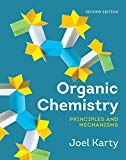
(a)
Interpretation:
It is to be determined how the given compound can be produced from an alkene.
Concept introduction:
An electrophile is an electron deficient species that is attacked by a nucleophile, which is an electron-rich species.
(b)
Interpretation:
It is to be determined how the given compound can be produced from an alkene
Concept introduction:
An electrophile is an electron deficient species that is attacked by a nucleophile, which is an electron-rich species. Alkenes can undergo acid-catalyzed hydration reactions in which the alkenes are treated with water in the presence of strong acids. The major product for these reactions is an alcohol. Water adds across the double bonded carbon atoms according to Markovnikov’s rule. The addition of water to an alkene favors the product in which the proton adds to the alkene carbon that is initially bonded to a greater number of hydrogen atoms (to the least substituted carbon atom), thus forming the stable carbocation intermediate. The rearrangement of the carbocation intermediate does not occur in this reaction. Finally, a proton transfer reaction must take place to form an uncharged product.
(c)
Interpretation:
It is to be determined how the given compound can be produced from an alkene
Concept introduction:
An electrophile is an electron deficient species that is attacked by a nucleophile, which is an electron-rich species. Alkenes can undergo acid-catalyzed hydration reactions in which the alkenes are treated with water in the presence of strong acids. The major product for these reactions is an alcohol. Water adds across the double bonded carbon atoms according to Markovnikov’s rule. The addition of water to an alkene favors the product in which the proton adds to the alkene carbon that is initially bonded to a greater number of hydrogen atoms (to the least substituted carbon atom), thus forming the stable carbocation intermediate. The rearrangement of the carbocation intermediate does not occur in this reaction. Finally, a proton transfer reaction must take place to form an uncharged product.
Want to see the full answer?
Check out a sample textbook solution
Chapter 11 Solutions
Organic Chemistry: Principles and Mechanisms (Second Edition)
- (SYN) Show how to produce each of the following compounds from a hydrocarbon that has the formula indicatedarrow_forwardIn the acid-catalyzed aromatic alkylation involving 1-methylcyclohexene and benzene, two isomeric products are possible, but only one is formed, as shown here. Draw the complete mechanism that leads to each product, and explain why only one isomer is formed.arrow_forwardFor each of the following reactions draw the structure of the major organic product in the box provided.Each numbered set of reagents above or below the arrow represents a complete separate reaction.For multi-step reactions give only the structure of the final product.arrow_forward
- Solve equationarrow_forwardProvide a complete, detailed mechanism for the reaction CH;CH,OH shown here.arrow_forwardProblem: Consider the addition of HCI shown below. (a) Draw the arrows for the first step of the mechanism, and show all possible carbocation intermediates. (b) Identify the most stable carbocation intermediate and explain your reasoning. (c) Draw the arrows for the second step of the mechanism, and give the expected major product(s). Pay attention to stereochemistry. Br HCIarrow_forward
- (SYN) Show how to produce each of the following from a hydrocarbon that has the formula indicated. ? C10H16 (b) (a) ? C3H10 Br Brarrow_forwardWith explanationarrow_forwardProblem: (a) Fill in the missing starting material for the following reaction. (b) Draw the complete mechanism for the reaction. Don't forget to include any resonance structures! (c) Explain how you determined the starting material. H₂O H₂SO4 HO OHarrow_forward

 Chemistry for Today: General, Organic, and Bioche...ChemistryISBN:9781305960060Author:Spencer L. Seager, Michael R. Slabaugh, Maren S. HansenPublisher:Cengage Learning
Chemistry for Today: General, Organic, and Bioche...ChemistryISBN:9781305960060Author:Spencer L. Seager, Michael R. Slabaugh, Maren S. HansenPublisher:Cengage Learning

